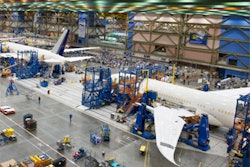SANTIAGO, Chile (AP) -- A series of fast-spreading port strikes in Chile are blocking exports of copper, fruit and wood pulp and keeping thousands of workers idle.
The stoppage in the world's top copper producing nation began in the northern port of Angamos more than two weeks ago, when workers began demanding a 30-minute lunch break and a place to set up a cafeteria. Dock workers in other northern ports have joined in solidarity, causing huge losses for the mining, timber and fruit industries in export-dependent Chile.
"The jobs of hundreds of thousands of Chileans are being jeopardized," Finance Minister Felipe Larrain said on Thursday. "I'm urging (workers) to be responsible and solve this problem soon."
Chile produces about a third of the world's copper and its stable economy is largely built around exports of minerals. The red metal alone accounts for roughly a third of government revenue, and the state has a policy of shoring up national reserves during periods of high copper prices.
Mining also offers many of the country's poor their best shot at a middle-class life, especially in the largely rural and rugged desert areas of northern Chile, where the majority of mines are located.
Mining Minister Hernan de Solminihac said Thursday that the ports affected are used to transport 60 percent of all copper shipments. Officials at the state-owned mining company Codelco told The Associated Press that about 60,000 metric tons of the company's copper has been stuck at port and it has lost more than $500 million since the strike began 21 days ago.
Chile is also a major global exporter of wine, salmon and fruit and the strikes are prompting concerns among state officials and industry leaders about the effect on the harvest. The Andean country's agricultural sector accounts for 800,000 jobs, or more than 10 percent of all employment, according to the government. Of those, 350,000 people work in the fruit sector, thousands of them as owners of their own farms.
"This can mean bankruptcy for many of them," Agriculture Minister Luis Mayol said in a joint press conference with the finance minister on Thursday.
Unionists at the Angamos port said in a statement that the stoppage is due to "labor neglect" by Ultraport, a company that specializes in freight handling and management at 20 Chilean ports.
Meanwhile, companies are running out of space to store cargo and fruit could start to rot with no end in sight for the lingering strikes.
Ronald Bown, the president of Chile's Export Association, told local radio Thursday that growers will temporarily stop harvesting in the central-south region Friday because there's no more space to store fruit.
"This is affecting medium and small-scale farmers," Bown said. "Many of them have their future on the line this season."
Fruit trade group Fedefruta said 1,600 containers are grounded at the San Antonio port. The company losses there total about $50 million up to now but could rise to $400 million if the stoppage continues throughout April.
"The year's work of more than 30,000 growers is being lost in a few days," said Fedefruta President Cristian Allendes.
Several timber companies have also suspended shipments.
Analysts and government officials fear the strike could dent Chile's image as a stable economy with a productive workforce that takes pride in meeting its obligations.
"It's not only these jobs that are directly in danger," Lavin said. "But future investment in the exporting sector and also meeting supplies abroad because the ships are paralyzed."






















